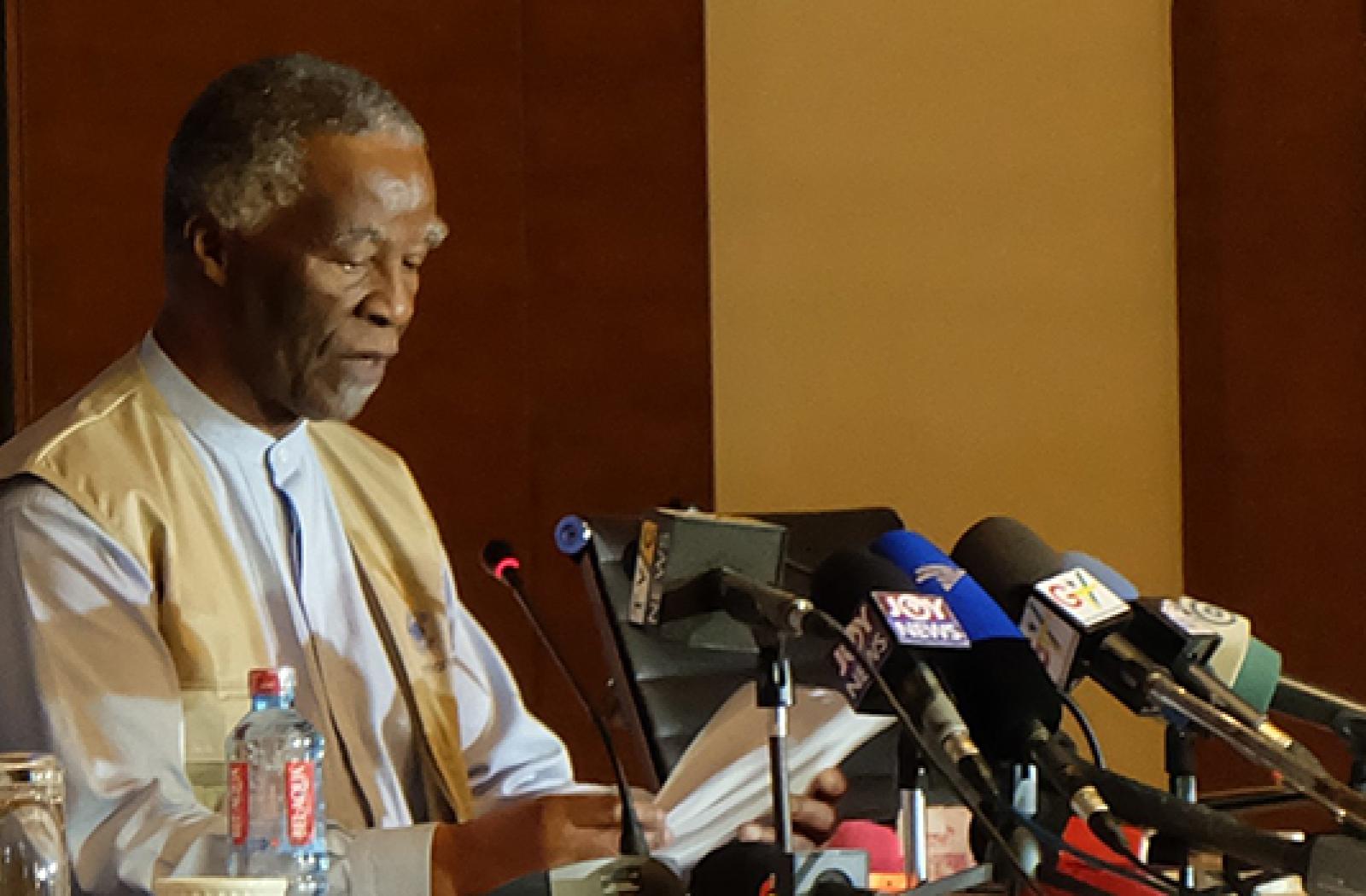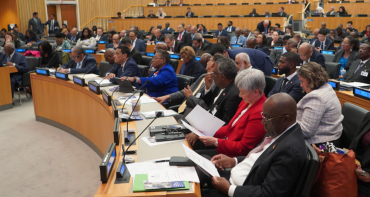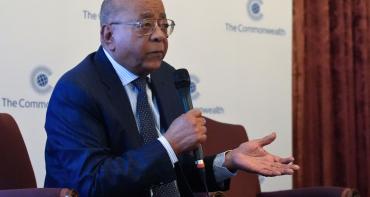Statement by HE Thabo Mbeki, Chair of the Commonwealth Observer Group to Ghana’s 2016 General Elections.

The Commonwealth Observer Group has been present in Ghana since 29 November 2016. Our arrival was preceded by an Advance Observer Team which has been in the country since 16 November 2016.
We have met with the Electoral Commission of Ghana, the presidential candidates, political parties, civil society, including women and youth groups, media representatives, the Police, Commonwealth High Commissioners as well as other national and international election observer missions.
On 4 December our teams were deployed throughout the ten regions of Ghana to observe the election environment and preparations for the polls. Ahead of Election Day, our teams met electoral officials, political parties, police and other stakeholders at the district and regional levels to gain a comprehensive picture of the electoral processes and environment at these levels. The Commonwealth teams therefore observed the final campaign events around the country.
The following is an initial assessment of the critical aspects of the election process and the electoral environment. Our final report, which we will complete before our departure, will be issued at a later date.
As the Commonwealth Observer Group we commend the people of the Republic of Ghana for the peaceful and orderly manner in which they exercised their right to vote on 7 December 2016.
Key Findings
Pre-Election Environment
The Campaign
In our briefings with several stakeholders, we were informed that the atmosphere at campaigns was vibrant and largely peaceful with a few incidents of violent clashes between the two main political parties. The campaign rallies of the major political parties were highly visible in various parts of the country. However, we were informed about the use of vigilante groups by some political parties.
Final campaign rallies of the two leading political parties were held in Accra with their campaign paraphernalia including billboards posters and supporters clad in party colours being highly visible. Other political parties had a lower level of visibility. We note that these final rallies were peaceful overall. The fundamental rights of candidates, political parties and supporters to assemble and campaign were broadly observed.
The campaign was highly competitive and closely fought between the leading political parties. Local peace efforts by the National Peace Council and its partners are to be commended for bringing together the Presidential candidates to sign a peace pact, known as the ‘Accra Declaration’, on 1 December 2016. At the signing of the peace pact, the Presidential Candidates declared their commitment to peace and to put the democratic aspirations of Ghanaians above all other considerations. We commend peace messages that were conveyed ahead of the elections by several groups including civil society groups, citizen observers and the youth.
The Media Environment
Media
Freedom of speech and expression is enshrined in Ghana’s constitution. It has led to a proliferation of media institutions, in particular radio.
Stakeholders informed the Group that both public and private media in Ghana have, in some cases, reported events inaccurately, especially those which have not been in favour of their respective sympathising party. There has been growing concern that a lack of regulation has led to unsubstantiated claims and counter claims from some reporters.
Stakeholders also expressed concerns about the use of inflammatory language particularly on radio.
Overall however, it was found that journalists acted responsibly and that the media was balanced in its coverage.
Social Media
Social media is growing rapidly in Ghana, with a 14 per cent growth in the last year. This has in the main been driven by young people who make up more than half of the population. As such, the use of Facebook, Twitter, WhatsApp and other online media has become an increasingly important means of communication during the Election campaign.
The Revised Legal Framework
Ghana’s 2016 General Elections were conducted under a revised legal framework as a result of reforms implemented since the previous elections. New provisions for these elections included a requirement for election officials and party or candidate agents to take oaths before a magistrate or judicial officer; provision for the adjournment of polling in the event of a disruption; serially numbered Statement of Polls and declaration of results sheets; sanctions in the law for election officials who negligently perform their work; the introduction of manual verification of voters, supplementary to biometric verification; a requirement for Returning Officers to issue copies of collation sheets to candidates/party agents; and the expansion of the list of special voters to include accredited media and security personnel as well as staff from the Electoral Commission.
Special Voting
We had the opportunity to observe special voting on 1 and 4 December 2016.This initiative, on the whole, was a success with a turnout of close to 80%. However, we received complaints that a fair number of voters who expected to cast their voters under this arrangement were unable, for various reasons, to locate their names on the special voting lists.
We commend the efforts of the Electoral Commission, security agencies and political parties, who quickly met to address the challenges encountered. We welcomed the setting aside of a second day for the continuation of the special voting, and the decision to deploy affected officials close to where they were registered to enable them to exercise their franchise on the main polling day.
Election Day
Set up of Polls
We observed and were credibly informed that the majority of the polling stations opened on time, with polling staff, election materials, security and party agents present. The exception was Jaman North Constituency in Brong Ahafo Region, where voting took place yesterday because there had been a dispute about the Voters Register. Where there were delays, these were reportedly caused variously by the late arrival of polling staff, security personnel or party agents or the availability of necessary equipment.
For the most part, the set-up of polling stations was adequate, though in some cases the positioning of the voting booths was such that the secrecy of the vote may have been compromised in some instances.
The majority of polling stations were accessible to persons with disabilities.
We noted that a significant number of polling staff were female, though the majority of Presiding Officers were male.
The voting process
Voting, for the most part, followed the prescribed procedures. Voters requiring assistance, including pregnant women, the elderly, those with disability were given preferential treatment at the polling stations. The majority of voters found their names on the voters’ lists and were able to vote. On the whole, relatively few incidents were reported that had a significant impact on the voting process.
The Count
At the close of polls at 17:00 hrs, the majority of polling stations had no queues. The counts in general followed the prescribed procedures. This included the signing by the party agents of the result declaration forms, and the posting of the official results in a visible and public place for the public to view.
Overall Conclusion
Our overall conclusion is that the opening, voting, closing and counting process at the polling stations on 7 December 2016 were credible, transparent and inclusive.
We commend and congratulate the Ghanaian voters, the Electoral Commission and polling staff, the political parties, the citizen observers, the media and the security forces for their respective roles in ensuring the success of the electoral process thus far.
We are mindful, however, that the process of collating the results is still on-going. Our final assessment of the entire process will be contained in our final report.
It is my hope and expectation that the positive, peaceful and orderly atmosphere that we all experienced on 7 December 2016 will continue to prevail as we await the conclusion of this electoral process.
We urge all parties and candidates to allow the Electoral Commission to announce the results of the Elections as well as respect the will of the people of Ghana as expressed at the polls. In the spirit of the Accra Declaration signed last week, we appeal to all Ghanaians to refrain from making any utterances or performing any acts that could trigger tensions or otherwise adversely affect the post-election environment. Furthermore, if any disputes should arise concerning the elections, those should be settled through prescribed legal channels.
Finally, it is our hope that by bringing this electoral process to a successful conclusion, Ghana will again serve as an inspiration and beacon for the rising tide of democracy throughout the Commonwealth.


